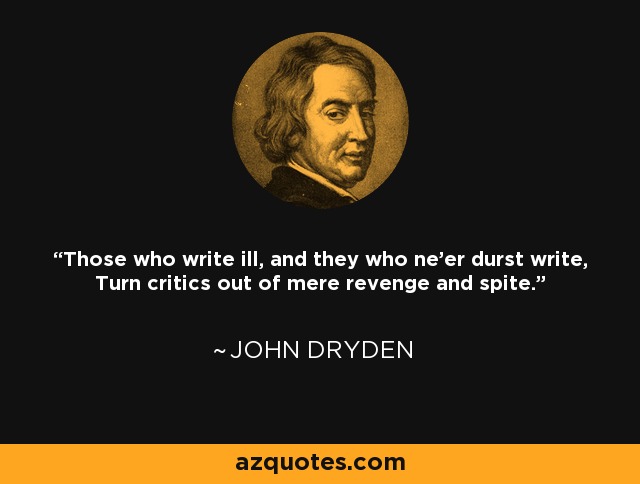Blog Post 2
John Dryden lived at a time in history that a man could be arrested or killed if they went against the king or talked badly about powerful people. This fact did not stop Dryden from becoming one of the most renowned satire writers of his time. Dryden would become famous for his heroic poems, different plays, and criticisms but his satire is what separated him from the rest. More about John Dryden. Satire is defined as a literary work holding up human vices and follies to ridicule or scorn. Dryden would use satire as a way to public mocked his personal and public enemies in a way that would not have any repercussions to him. Using satire this way is extremely similar to how people or comedians use satire today.
Comedians today all practice using satires in their standup or on the shows. Comedy Centrals television shows The Daily Show with Trevor Noah is a perfect example of today's satire. Noah uniquely uses satire to illustrate the issues with President Trump.
Dryden's use of satire and Noah’s use are similar in many regards as Noah is using current events to make his satire. One major difference between the two is that Dryden would most likely be killed if he wrote anything derogatory about the king but Noah is more than willing to highlight all of Trump's mistakes. I believe that if Dryden was alive today and was allowed to have the same level of freedom, Dryden would have been an extremely successful comedian.

Dryden beliefs in what he considered good satire or what he believed was essential to creating something good was shown through is rivalries. Dryden's Rivalries. Through his rivalry with Shadwell, Dryden shows the important characteristics that he believed to be essential. First being the wit of the satire was more important than the point being made. If the satire is too easily understood it was not good. By giving this criticism Dryden describes how Shadwell is a poor writer of satire and is lazy or used cheap jokes Dryden's criticisms were highly regarded and gave Dryden the power to decide ultimately what was considered good or bad.
Sources
Marshall, Ashley. John
Dryden’s Satiric Poetry,
https://www.bl.uk/restoration-18th-century-literature/articles/john-drydens-satiric-poetry
Poetry Foundation. John Dryden. https://www.poetryfoundation.org/poets/john-dryden
Meriiam Webster. Satire. https://www.merriam-webster.com/dictionary/satire
Trevor Noah: Trump's Response To coronavirus Is Exposing His Lack Of Leadership. https://www.youtube.com/watch?v=r2xPTP5hr6o




This is a great explanation of John Dryden and his take on satire. I do see a similarity between talk show comedians' use of satire and Dryden's. The only thing I'd argue is that the intent behind the wit of his satire was to generate more of an appreciation of the jab rather than his target to take offense. This was a focus on the subtlety of the wit, to which you pointed out in the last paragraph as being essential. It has to be almost completely missed and I agree wholeheartedly. But I see where you're coming from; during his time it was probably better to keep satire as a easy thing to miss in a reading as a way of saying, "ha! you couldn't get it!" You bring a good point that has me thinking, would he, in modern times, become a comedian? I honestly don't know.
ReplyDelete